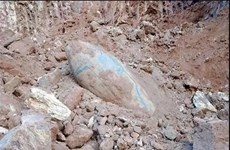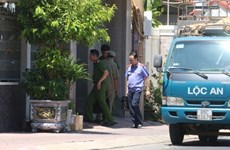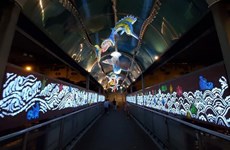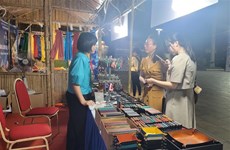North - South express railway to be prioritised in next 10 years
Apart from upgrading existing railway routes, an array of new routes are set to be built to promote economic development under the railway planning for the 2021 - 2030 period.
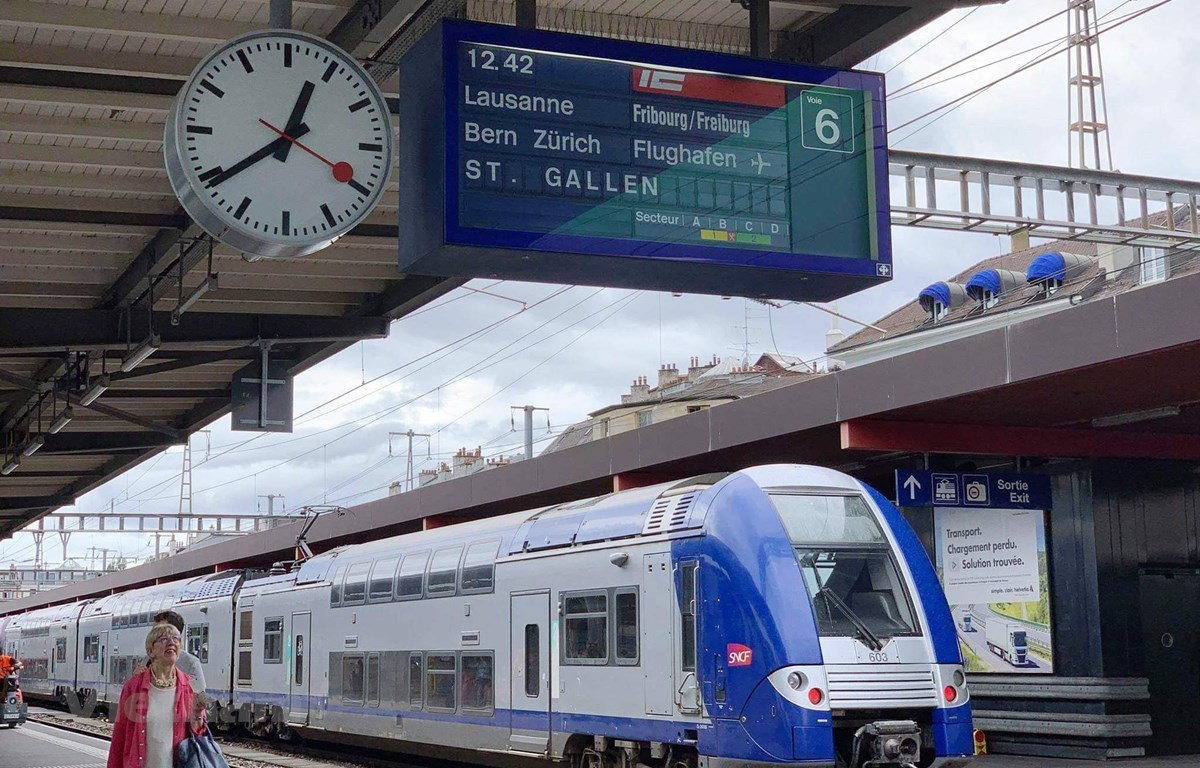
An express train in a European country (Photo: VietnamPlus)
Hanoi (VNA) - For the 2021 - 2030 period, the Ministry of Transport will prioritise the construction of the North - South express railway, with Hanoi - Vinh and Nha Trang - Ho Chi Minh City to be the first sections to be built.
However, many people have also wondered about the capital sources for investment amid the limited State budget.
Nine new rail routes to be built
In the draft railway network plan for 2021 - 2030, with a vision to 2050, released by the Ministry of Transport, the national railway network during this period will consist of 16 routes with the total length of more than 4,746km. They include seven existing routes that are over 2,378km long and nine new ones stretching 2,368km.
The nine new routes include the North - South express railway (665km), with Ha Noi - Vinh (295km) and Nha Trang - HCM City (370km) to be built first. This project will need an investment of 112.325 trillion VND (about 4.9 billion USD) during the 10-year period.
The others are Yen Vien - Pha Lai - Ha Long - Cai Lan (129km) that will need 6 trillion VND, a 78km-long route (48.4 trillion VND) linking Lach Huyen and Dinh Vu ports with the Yen Vien - Pha Lai - Cai Lan rail route, Bien Hoa - Vung Tau (84km, over 10 trillion VND), Thu Thiem - Long Thanh (38km, 6.6 trillion VND), Tan Ap - Mu Gia - Vung Ang (119km), HCM City - Can Tho (174km, 123 billion VND), and Di An - Loc Ninh (128km, 100 billion VND).
The draft plan also proposes almost 47.27 trillion VND be allocated for upgrading existing rail routes in the 2021 - 2030 period.
As many as 239.03 trillion VND in total will be needed for railway construction and upgrades under the plan. The funding is set to come from the central budget and loans, and via public - private partnerships.
The transport sector expects that by 2050, it will have completed the North - South express railway; the routes connecting with Hanoi and HCM City; the ones linking seaports, industrial parks, economic zones, and Central Highlands provinces; along with coastal and trans-Asia railways.
Investment resources need to be diversified
Dang Quyet Tien, Director of the Department of Corporate Finance under the Ministry of Finance, admitted that the State’s resources remain limited, recommending State agencies work out a long-term strategy and make appropriate investment so as to attract resources for development.
Road transport has become “saturated”, and it is now necessary to develop rail transport in order to ensure the economy’s competitiveness, he added.
Vu Anh Minh, Chairman of the Members’ Council of the Vietnam Railways Corporation, said developing express railway is of great necessity in the geographical, natural, and geo-political conditions of Vietnam.
Express railway should be built as soon as possible since once coming into being, it will immediately boost socio-economic development, he said, adding that when considering a project, the important thing is not how much it will cost but how effective it will be.
However, he also pointed out that the railway sector has not stood out when it comes to the allocation of funding for developing different means of transport.
State agencies should soon complete the mechanisms and policies for encouraging private investment in the sector, Minh suggested.
Other countries’ experience show that the State mostly invests in the tracks and attached infrastructure while other facilities like terminals, warehouses, and roads to train stations are developed by the private sector.
Meanwhile, the routes linking the national railway network with seaports or dry ports can be invested by either the State or the private sector, he added./.
However, many people have also wondered about the capital sources for investment amid the limited State budget.
Nine new rail routes to be built
In the draft railway network plan for 2021 - 2030, with a vision to 2050, released by the Ministry of Transport, the national railway network during this period will consist of 16 routes with the total length of more than 4,746km. They include seven existing routes that are over 2,378km long and nine new ones stretching 2,368km.
The nine new routes include the North - South express railway (665km), with Ha Noi - Vinh (295km) and Nha Trang - HCM City (370km) to be built first. This project will need an investment of 112.325 trillion VND (about 4.9 billion USD) during the 10-year period.
The others are Yen Vien - Pha Lai - Ha Long - Cai Lan (129km) that will need 6 trillion VND, a 78km-long route (48.4 trillion VND) linking Lach Huyen and Dinh Vu ports with the Yen Vien - Pha Lai - Cai Lan rail route, Bien Hoa - Vung Tau (84km, over 10 trillion VND), Thu Thiem - Long Thanh (38km, 6.6 trillion VND), Tan Ap - Mu Gia - Vung Ang (119km), HCM City - Can Tho (174km, 123 billion VND), and Di An - Loc Ninh (128km, 100 billion VND).
The draft plan also proposes almost 47.27 trillion VND be allocated for upgrading existing rail routes in the 2021 - 2030 period.
As many as 239.03 trillion VND in total will be needed for railway construction and upgrades under the plan. The funding is set to come from the central budget and loans, and via public - private partnerships.
The transport sector expects that by 2050, it will have completed the North - South express railway; the routes connecting with Hanoi and HCM City; the ones linking seaports, industrial parks, economic zones, and Central Highlands provinces; along with coastal and trans-Asia railways.
Investment resources need to be diversified
Dang Quyet Tien, Director of the Department of Corporate Finance under the Ministry of Finance, admitted that the State’s resources remain limited, recommending State agencies work out a long-term strategy and make appropriate investment so as to attract resources for development.
Road transport has become “saturated”, and it is now necessary to develop rail transport in order to ensure the economy’s competitiveness, he added.
Vu Anh Minh, Chairman of the Members’ Council of the Vietnam Railways Corporation, said developing express railway is of great necessity in the geographical, natural, and geo-political conditions of Vietnam.
Express railway should be built as soon as possible since once coming into being, it will immediately boost socio-economic development, he said, adding that when considering a project, the important thing is not how much it will cost but how effective it will be.
However, he also pointed out that the railway sector has not stood out when it comes to the allocation of funding for developing different means of transport.
State agencies should soon complete the mechanisms and policies for encouraging private investment in the sector, Minh suggested.
Other countries’ experience show that the State mostly invests in the tracks and attached infrastructure while other facilities like terminals, warehouses, and roads to train stations are developed by the private sector.
Meanwhile, the routes linking the national railway network with seaports or dry ports can be invested by either the State or the private sector, he added./.









